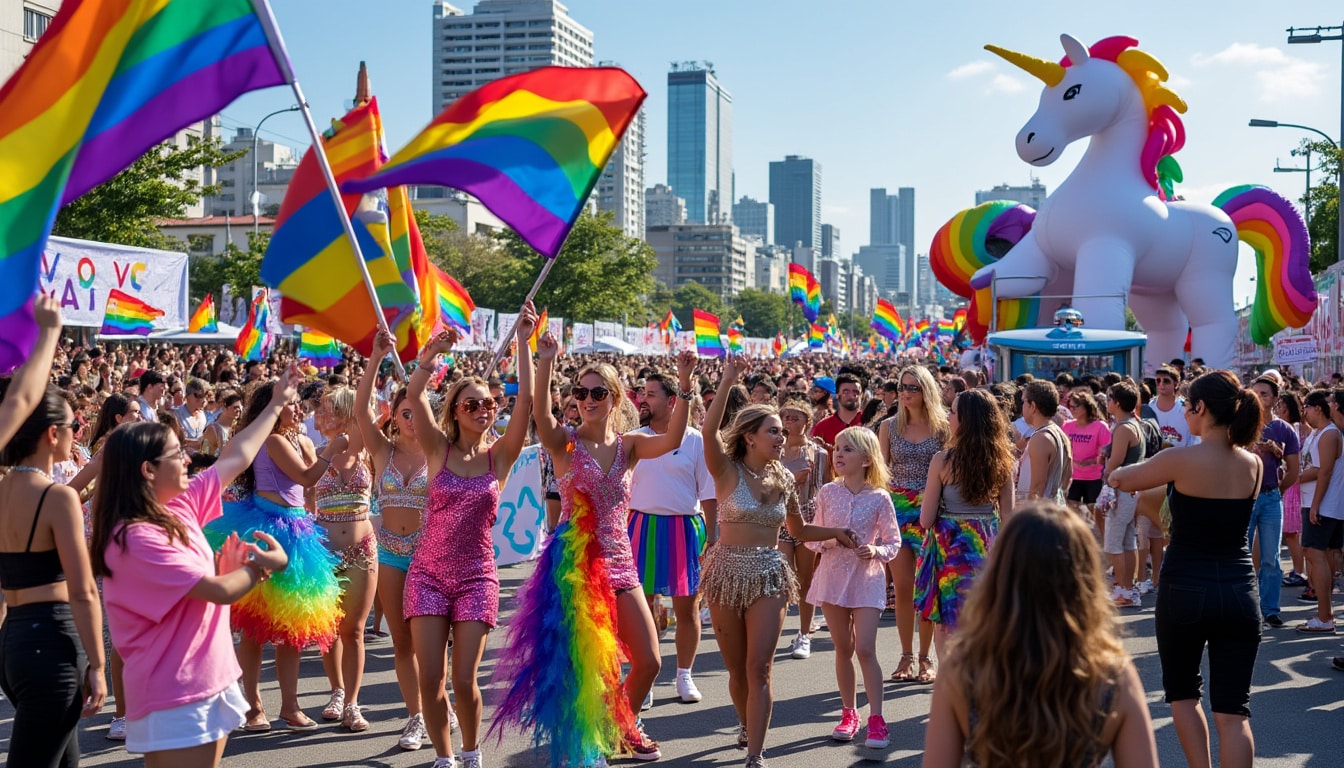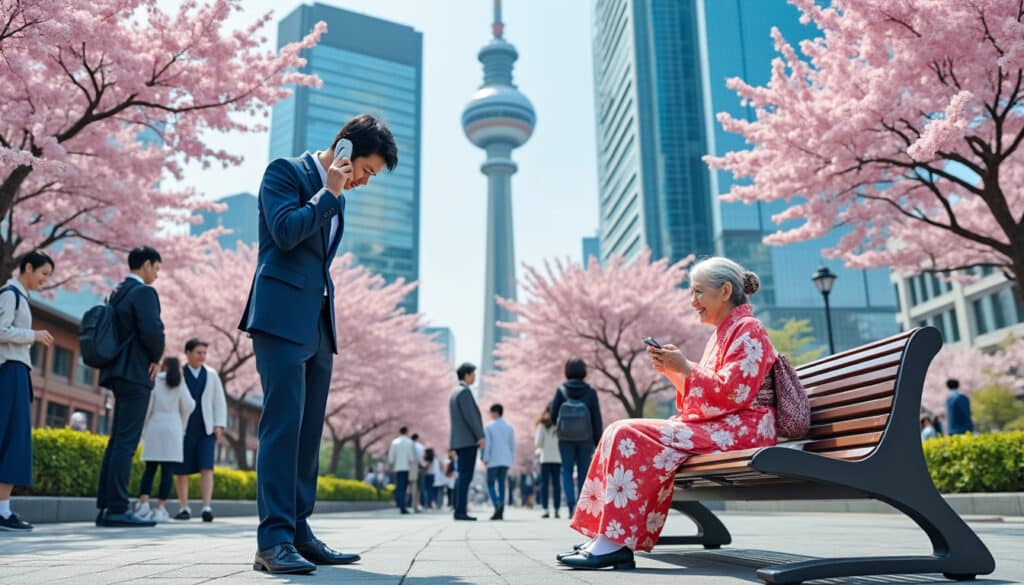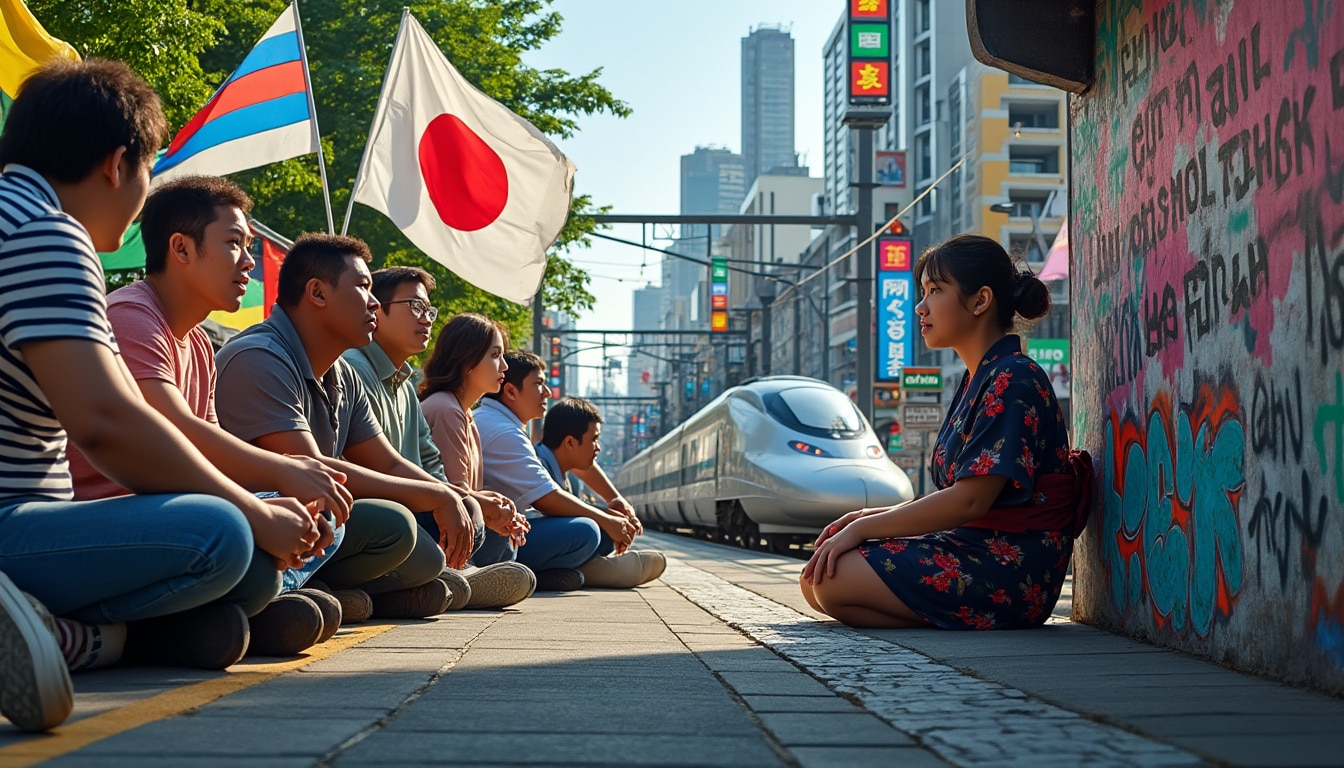Chiba, known for its scenic landscapes and bustling city life, is grappling with pressing social and discrimination challenges. Despite being home to a rich cultural heritage and significant economic activity, Chiba faces issues akin to those in other parts of Japan and the world. From LGBTQ rights and ethnic discrimination to the treatment of migrant workers and gender inequality, Chiba’s social fabric exhibits complex layers of disparity. This complexity demands attention and action from local authorities, organizations such as the Chiba Equality Project, and society as a whole. As awareness grows, there are efforts to bridge the gaps and promote diversity and inclusion.
LGBTQ Rights and Recognition in Chiba
In the realm of LGBTQ rights, Chiba, like much of Japan, struggles with the absence of a national anti-discrimination law. While the Tokyo Metropolitan Government has implemented sweeping initiatives to support LGBTQ communities, Chiba has had to chart its course in fostering inclusivity. Local efforts led by advocacy groups such as Equality Now and Empower Chiba have been pivotal in this journey. Chiba has taken progressive steps by acknowledging same-sex partnerships, yet these measures fall short due to their lack of legal recognition. Without the backing of a national framework, these local ordinances lack the strength to combat entrenched societal biases seriously.
Important strides have been made through annual events such as Pride Parades, which bring visibility and foster community among LGBTQ individuals in Chiba. These events often draw large crowds, both supporters and allies, amplifying the movement for equality. However, these moments of celebration are marred by incidents of discrimination and hostility. Despite legal advancements in several regions, societal attitudes often lag, reflecting a broader cultural reluctance to embrace diversity.
The absence of official legal status for same-sex relationships restricts these individuals’ access to vital benefits such as spousal insurance and hospital visitation rights. Chiba’s advocacy groups are working tirelessly to bridge these gaps, providing resources, education, and safe spaces for LGBTQ individuals and allies. Initiatives like the Chiba Social Initiative play a crucial role in educating the broader public about the significance of equality in fostering a harmonious society.
In pushing for national change, Chiba stands as a testament to the potential of grassroots movements to influence broader societal norms. Through partnerships with international organizations like the Human Rights Campaign and Global Citizen, Chiba leverages global best practices in its local advocacy, signaling its commitment to a more inclusive future.
| LGBTQ Initiative | Description | Impact |
|---|---|---|
| Pride Parades 🌈 | Annual events celebrating and raising awareness for LGBTQ communities. | Increases visibility and community engagement. |
| Equality Advocacy 🏳️🌈 | Efforts by local groups to promote LGBTQ rights and recognition. | Drives policy change and educates the public. |

Challenges in Adoption and Recognition
The journey towards recognition for LGBTQ individuals is fraught with challenges. Despite the progressive mindsets in urban centers, traditional attitudes still permeate rural Chiba, where many residents hold conservative views. In these areas, LGBTQ individuals often face significant barriers to expressing their identities openly. Local support systems, such as counseling and community networks, are essential in these regions to counteract discrimination’s isolating effects.
- 🌟 Legal hurdles for same-sex partnerships.
- 🌟 Societal pressures and conservative views.
- 🌟 Limited access to LGBTQ-friendly services outside urban centers.
To combat these issues, continuous dialogue and educational programs are necessary. Collaborative efforts between local governments and organizations like Inclusion Alliance aim to dismantle prejudiced frameworks and promote an egalitarian approach to societal diversity.
Ethnic Discrimination: The Zainichi Korean Experience
Chiba, a vibrant hub of cultural diversity, is nevertheless not immune to issues of ethnic discrimination, particularly concerning Zainichi Koreans. This community, composed of ethnic Koreans residing permanently in Japan, often faces discrimination due to historical tensions rooted in Japanese colonization. Despite their long-standing contributions to Japanese society, many Zainichi Koreans are compelled to navigate a complex web of societal bias and systemic barriers.
Employment remains a significant area of concern, with discriminatory practices persisting in several sectors. A lack of citizenship recognition limits career prospects and access to certain public services for Zainichi Koreans. The discriminatory hiring practices are evident in the unemployment rates, which are substantially higher than the national average. Organizations such as the Social Justice League are working tirelessly to address these disparities, advocating for fair employment practices and equal opportunities.
In tackling these ingrained issues, educational initiatives are crucial. Schools in Chiba have begun integrating counter-discrimination curricula, aiming to foster empathy and understanding from an early age. These programs emphasize the importance of recognizing and respecting cultural diversity, equipping the younger generation with the tools to challenge prejudice.
| Discrimination Aspect | Challenge | Strategies |
|---|---|---|
| Employment 🔍 | Higher unemployment rates compared to nationals. | Advocacy for equal opportunities and fair practices. |
| Cultural Integration 🌎 | Stereotyping and cultural bias. | Educational programs and cultural awareness initiatives. |
Community centers across Chiba play a pivotal role in supporting Zainichi Koreans by providing cultural and legal assistance. These centers often collaborate with initiatives like Diversity Works to increase their reach and effectiveness, facilitating workshops and events that celebrate Korean heritage while promoting social unity.
Legal and Social Recognition
While some progress has been made, there remains a substantial path toward full social integration and legal recognition for Zainichi Koreans. The community continues to advocate for comprehensive policy reforms that acknowledge their unique position within Japanese society. Empowering local voices and promoting legal advocacy are integral to these efforts, aiming to secure fundamental rights and dismantle barriers that hinder equality.
Migrant Workers and Labor Rights in Chiba
The treatment of migrant workers remains a critical issue in Chiba, highlighting broader labor rights concerns that affect workers’ safety and security. The controversial “Foreign Technical Intern Training Program” has been a source of concern due to reports of exploitative conditions experienced by foreign interns. The program, originally intended to provide skill development opportunities, often traps workers with unchangeable employment contracts, exposing them to illegal overtime and inadequate compensation.
The narratives of those affected underscore the urgent need for reform. Reports indicate over 170 deaths among technical interns between 2012 and 2017, prompting human rights groups and global organizations such as Amnesty International to demand immediate action. In response, Chiba has undertaken initiatives like the Chiba Social Initiative to address these abuses, striving to ensure fair labor practices and protect workers’ rights.
Efforts to create a safer working environment include advocacy for policy changes that would allow workers to switch employers without repercussions. Additionally, education campaigns aimed at employers emphasize the importance of ethical labor practices and compliance with existing labor laws. Partnerships with local advocacy groups, such as Empower Chiba, and international bodies are crucial in building momentum for these necessary changes.
- ⚖️ Demand for reform in the labor training program.
- ⚖️ Advocacy for fair labor practices and worker protections.
- ⚖️ Calls for policy changes concerning employment mobility.
| Labor Rights Issue | Challenge | Initiatives |
|---|---|---|
| Program Exploitation 🔨 | Unfair labor conditions and restricted mobility. | Advocacy and policy reform campaigns. |
| Workplace Safety 🛠️ | Dangerous working environments. | Safety protocols and educational workshops. |
Collaboration for Change
Efforts to improve the situation of migrant workers in Chiba involve collaboration between government bodies and non-profit organizations. Initiatives spearheaded by the Chiba Equality Project focus on integrating best practices from international frameworks to enhance local labor policies, ensuring they are both comprehensive and enforceable.
Challenges of Women’s Equality in Chiba
Gender inequality remains a pervasive issue in Chiba, reflected in both professional and personal domains. Despite the contributions of women to various sectors, systemic barriers limit their participation and advancement in the workforce. Prevalent stereotypes and workplace cultures traditionally perceive women primarily through domestic roles, impacting their career trajectories.
The professional landscape often restricts women to stereotypical roles, expecting their withdrawal after childbirth—a notion that impedes career growth. This expectation extends to discrimination in promotions and job opportunities, echoing broader national trends observed in Japan’s employment sectors. Women’s rights advocates in Chiba, supported by global entities like the Social Justice League, work to dismantle these barriers through persistent advocacy and educational campaigns.
Economic disparities compound these issues, with women participating less in management positions despite similar qualifications as their male counterparts. The gap is further exacerbated by gender-based violence, including harassment and domestic abuse. Efforts by local organizations, such as the Women’s Support Center, are pivotal in providing resources and support to those affected.
- 🔍 Gender bias in employment.
- 🔍 Barriers to career advancement for women.
- 🔍 Prevalent gender-based violence.
| Women’s Rights Issue | Challenge | Solutions |
|---|---|---|
| Employment Equity 💼 | Disparity in employment opportunities and promotions. | Advocacy for equal opportunities and support networks. |
| Domestic Abuse 🚨 | High incidence of domestic violence. | Support services and legal advocacy. |
Advocacy and Future Directions
The Chiba Equality Project and similar initiatives are at the forefront of promoting gender equality in Chiba. By working closely with local communities and leveraging global networks, these organizations aim to spark lasting cultural shifts towards equality and acceptance. Campaigns advocating for policy changes and empowering local voices are pivotal in shaping a society where gender equity is the norm.
Education and Rights of Children in Chiba
The right to education is a fundamental issue in Chiba, affecting both foreign and local children. Despite Japan’s commitment to the Convention on the Rights of the Child, a substantial number of foreign children do not attend school. This reality highlights the structural obstacles that hinder their access to education, contravening both national legislation and international agreements.
Structural disparities manifest in the form of cultural and language barriers, which present significant challenges to the integration of foreign children. These barriers often lead to social isolation, affecting their academic performance and social development. Local initiatives, such as Empower Chiba, are working to create more inclusive educational settings by offering multilingual support and fostering environments conducive to cultural diversity.
To address this pressing issue, schools in Chiba are enhancing their curricula to reflect a more global perspective, aiming to cultivate an understanding and acceptance of cultural differences among students. Efforts to bridge the language gaps include the establishment of bilingual and language support programs to assist non-Japanese speaking students.
- 📚 Language and cultural barriers in education.
- 📚 High dropout rates among foreign children.
- 📚 Efforts to create inclusive and supportive schools.
| Educational Access Issue | Challenge | Approach |
|---|---|---|
| Language Barriers 🗣️ | Limited support for non-Japanese speaking students. | Bilingual programs and language support initiatives. |
| School Enrollment 📑 | Low enrollment rates among foreign children. | Inclusive policies and educational reform. |
Future Initiatives for Educational Equity
To ensure all children in Chiba have the opportunity for quality education, continued efforts are essential from schools, local governments, and advocacy groups. These stakeholders must collaborate to eliminate barriers and foster an educational environment that values and nurtures every child’s potential.
Frequently Asked Questions (FAQ)
What are the main challenges faced by the LGBTQ community in Chiba?
The primary challenges include the lack of legal recognition for same-sex partnerships, societal bias, and limited access to LGBTQ-friendly resources in rural areas.
How is Chiba addressing ethnic discrimination?
Chiba is addressing ethnic discrimination through advocacy for fair employment practices, educational programs to foster cultural understanding, and community support services.
What steps are being taken to improve the rights of migrant workers?
Initiatives focus on reforming labor training programs, advocating for fair labor practices, and enhancing worker protections with the collaboration of local and international organizations.
What efforts are being made to promote gender equality in Chiba?
Efforts include advocacy for employment equity, resources for victims of domestic abuse, and campaigns to shift cultural perceptions toward gender roles.
How is Chiba improving educational access for children?
Chiba is enhancing educational access by implementing bilingual support programs, fostering inclusive policies, and creating environments conducive to multicultural learning.

Legal Information and Rules in Chiba
Chiba, a bustling prefecture in Japan, is not only known for its beautiful landscapes and vibrant local culture, but also for its intricate legal system that serves both residents and foreign nationals alike. Navigating this system requires understanding various legal…

Calling and communication rules in Chiba
Understanding the intricate details of calling and communication rules in Chiba is essential for anyone looking to connect with this vibrant region of Japan. Chiba, with its bustling cities and serene landscapes, is not just a destination for tourists but…

Criminal status and entry to Chiba
As international travelers explore opportunities in Japan, understanding the implications of a criminal record on entry into Chiba becomes increasingly vital. This comprehensive guide offers insights into the procedures, requirements, and potential challenges faced by those with a criminal history…

Drinking and age restrictions in Chiba
Japan is known for its rich cultural heritage, culinary delights, and exotic landscapes. Among its myriad attractions, the intricate tapestry of age-related regulations, especially concerning drinking, often piques the curiosity of both tourists and locals. In the prefecture of Chiba,…

Chiba Prefecture, located just to the east of Tokyo, is a vibrant region offering a mix of modern attractions and natural beauty. As public holidays approach, locals and travelers alike are eager to explore its many facets, from bustling amusement…

Smoking, drugs, and red light laws in Chiba
Chiba—a bustling hub of culture and commerce—carries an intriguing blend of traditional values and modern influences. As Japan treads a cautious path between preserving cultural values and embracing modernity, Chiba’s approach to smoking, drug use, and red-light district regulations offer…


